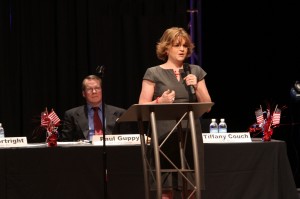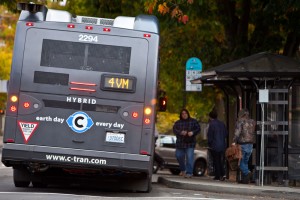If C-Tran abandons future investment in high capacity transit, it will have sufficient cash reserves to maintain current bus service for 20 more years, according to an independent financial analysis published Nov. 3 by Vancouver-based forensic accountant Tiffany Couch.
C-Tran officials vehemently denied Couch’s conclusions, setting up a debate over budget numbers mere days before Clark County voters learn the results of C-Tran’s proposed .2 percent sales tax hike, Prop. 1, on Nov. 8.
C-Tran’s election materials state that it is using $6 million to $7 million of cash reserves each year to fund bus and C-Van service and that these reserves will be gone by 2013 without an additional $8 million to $9 million in tax revenue each year. If Prop. 1 fails, C-Tran says it will have to cut service by 35 percent by 2013.
“We are losing millions a year with our current tax structure,” said Clark County Commissioner Marc Boldt, who chairs the C-Tran board.
Couch says Prop. 1 is unnecessary
Couch, however, thinks C-Tran’s stance is misleading and doesn’t believe the agency needs passage of Proposition 1 to adequately provide current bus service. In her white paper, Couch says that C-Tran’s operational cash balance dropped gradually by $9.7 million, or an average of $1.9 million per year, between 2006 and 2010. She estimates C-Tran will run a cash deficit of less than $1 million in 2010 and $1.9 million in 2010 – a third of what the C-Tran board budgeted for.
In its 2011–2012 biennium budget, the C-Tran board assumed cash deficits of $6.2 million in 2011 and $7 in 2012.
“The bleak cash projection put forth by C-Tran does not appear to be an accurate portrayal of the agency’s cash position should current levels of bus service be maintained,” wrote Couch, who says she was not paid by any external parties to produce the white paper.
High capacity transit projects will drain reserves
Couch believes the real story of C-Tran’s projected deficits lies in its investment in high capacity transit projects, listed both in its 2011–2012 budget and its 20-year plan. The 2011–2012 expenditures include $960,000 for costs associated with Prop. 1 and a future sales tax vote on light rail and bus rapid transit operations next year, $200,000 for consulting costs related to the Columbia River Crossing Light Rail Project, and a $500,000 high capacity transit study, for a total of $1.6 million.
Couch writes that C-Tran is planning $27.5 million in capital expenditures between 2011 and 2015, $11.3 million of which are connected to possible high capacity projects. (C-Tran disputes this, putting the number at $1.3 million).
“It appears that not only are the C-Tran planned budget deficits significantly inflated, they also include millions of dollars worth of planned High Capacity Transit expenditures – expenditures for potential future bus rapid transit and light rail services that have nothing to do with current C-Tran bus services,” Couch wrote.
C-Tran lambasts report
C-Tran staff responded Friday, calling Couch’s analysis incomplete and “fatally flawed” in a letter to C-Tran’s board of directors.
Scott Patterson, director of development and public affairs, and Diane O’Regan, director of administrative services, wrote that Couch used an incomplete cash analysis to conclude that C-TRAN bus services would “remain whole” for 10 years.
Neither Patterson nor O’Regan returned calls on Friday, and C-Tran executive director and CEO Jeff Hamm was away at a conference out of state, according to C-Tran staff.
In the written statement, Patterson and O’Regan argued that Couch only used nine months of operating expenses to project 17 years of expenses, incorrectly calculated future retail sales tax revenues, eliminated all capital improvements for the next 17 years, assumed no changes in revenue sources, and predicted expenses to increase an average of less than one half of one percent.
“Essentially, this means no cost increases for fuel, equipment parts, or maintaining our vehicles, and no adjustment for cost of living increases (CPI) for 17 years,” they wrote.
In an e-mailed response, Couch stood by her analysis that C-Tran had sufficient cash reserves to fund bus service until 2021, as long as it removed capital expenditures related to high capacity transit from its 2030 budget.
Regarding C-Tran’s complaint that she assumed only an annual 1.5 percent increase in expenses, Couch says she chose not to use C-Tran’s “highly aggressive” revenue growth rates, which expects sales tax revenue growth of 140.6 percent over the next 19 years.
“Had I done that, C-Tran would never run out of cash,” Couch wrote.
Patterson and O’Regan also wrote that Couch ignored the fact that the C-Tran board requires 90 days “cash in hand,” estimated to be between $3 and $5 million, but Couch replied that she included it. Finally, Couch said she used actual retail sales found in C-Tran’s 2010 federal financial report.
Couch did admit to one math error in which she counted the $200,000 CRC consulting costs twice.
2030 budget depends on tax hikes
Commissioner Boldt, who hadn’t yet read Couch’s white paper when contacted, said that before picking apart C-Tran’s 2030 plan, it’s important to remember that the budget won’t happen as planned without passage of Proposition 1 and two more tax increases. If future tax revenue isn’t available, the board will have to revise the plan.
“If nothing passes, that plan will look far different,” he said by phone.
Boldt reiterated the board’s commitment that no funds raised as a result of Prop. 1 would be used for light rail and that he would push for a formal board resolution to that effect should the measure pass.
Nevertheless, Couch points to C-Tran’s own 2030 plan as evidence of its commitment to high capacity transit. Whether C-Tran can maintain both its bus service levels and transit projects into the future, she’s not sure. But what she is sure of is that C-Tran can easily cover essential bus service with its current reserves – if it’s willing to.
See our continuing coverage of the Columbia River Crossing Light Rail project.
Do you have information to share on the CRC? To respond anonymously call 260-816-1426. To allow your comments to be used on COUV.COM call 260-816-1429.











